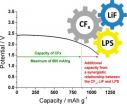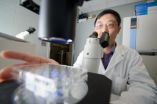(Press-News.org) New research led by Alison Allan, PhD, a scientist at Western University and the Lawson Health Research Institute, shows why breast cancer often spreads or metastasizes to the lung.
Breast cancer is the number one diagnosed cancer and the number two cause of cancer-related deaths among women in North America. If detected early, traditional chemotherapy and radiation have a high success rate, but once the disease spreads beyond the breast, many conventional treatments fail. In particular, the lung is one of the most common and deadly sites of breast cancer metastasis and this has a significant impact on patient quality of life and survival.
Previous work by Allan's research team has shown that a specific type of breast cancer cell, the breast cancer stem cell (CSC), is responsible for metastasis in animal models, particularly to the lung. In this paper, published online in the journal Neoplasia, the researchers developed an innovative ex vivo (outside the living organism) model system that simulates different organ environments. They observed that breast CSCs have a particular propensity for migrating towards and growing in the lung, and they identified specific interactions between breast CSCs and lung-derived proteins that could be disrupted to reduce the metastatic behavior of breast cancer.
Allan says in metastasis, there's a theory called the seed and soil hypothesis. "Analogous to a dandelion, when it goes to seed, the seeds blow all over the place. But they don't necessarily grow everywhere they land; they grow only in congenial soil that has the right nutrients that support growth of seeds in a foreign environment. In the situation of metastasis, the tumor cells ('seeds') have some inherent factors that determine their aggressiveness and ability to metastasize, while the different organs ('soil') are believed to provide important factors that attract tumor cells to particular organs and help support their survival and growth into metastatic tumors," explains Allan, an associate professor in the Departments of Oncology, and Anatomy and Cell Biology at Western's Schulich School of Medicine & Dentistry. "A lot of research has been done on the cancer cells because they're easy to study, but not a lot has gone into understanding the 'soil factor.' We've uncovered some specific proteins that are produced in the lung that seem to interact with cancer stem cells, making the lungs a congenial place for cancer cells to grow."
The research was funded by the Canadian Breast Cancer Foundation- Ontario Region. Looking forward, the translation of this knowledge to the clinic could have important future implications for improved treatment of breast cancer. The results of this study will also lay the groundwork for future clinical studies aimed at investigating whether increased breast CSCs in the primary tumor may pre-dispose some patients to lung metastasis, and if so, whether directed monitoring (i.e. by imaging or ex vivo analysis) may be beneficial for early detection and successful treatment.
INFORMATION: END
New study helps to explain why breast cancer often spreads to the lung
2014-04-24
ELSE PRESS RELEASES FROM THIS DATE:
Parents of severely ill children see benefits as caregivers, says study
2014-04-24
Benefits often coexist with the negative and stressful outcomes for parents who have a child born with or later diagnosed with a life-limiting illness, says a recent study led by a researcher at the University of Waterloo.
While the challenges are numerous and life-changing and stress levels high, the vast majority of parents who participated in the Waterloo-led research reported positive outcomes as well, a phenomenon known as posttraumatic growth. The findings appear in the most recent issue of the American Journal of Orthopsychiatry.
"What is pivotal is the meaning ...
'Double-duty' electrolyte enables new chemistry for longer-lived batteries
2014-04-24
OAK RIDGE, Tenn., April 24, 2014 — Researchers at the Department of Energy's Oak Ridge National Laboratory have developed a new and unconventional battery chemistry aimed at producing batteries that last longer than previously thought possible.
In a study published in the Journal of the American Chemical Society, ORNL researchers challenged a long-held assumption that a battery's three main components -- the positive cathode, negative anode and ion-conducting electrolyte -- can play only one role in the device.
The electrolyte in the team's new battery design has ...
Cell resiliency surprises scientists
2014-04-24
EAST LANSING, Mich. --- New research shows that cells are more resilient in taking care of their DNA than scientists originally thought. Even when missing critical components, cells can adapt and make copies of their DNA in an alternative way.
In a study published in this week's Cell Reports, a team of researchers at Michigan State University showed that cells can grow normally without a crucial component needed to duplicate their DNA.
"Our genetic information is stored in DNA, which has to be continuously monitored for damage and copied for growth," said Kefei Yu, ...
Vanderbilt study finds physical signs of depression common among ICU survivors
2014-04-24
Depression affects more than one out of three survivors of critical illness, according to a Vanderbilt study released in The Lancet Respiratory Medicine, and the majority of patients experience their symptoms physically rather than mentally.
It is one of the largest studies to investigate the mental health and functional outcomes of critical care survivors, according to lead author James Jackson, Psy.D., assistant professor of Medicine, and it highlights a significant public health issue, with roughly 5 million patients admitted to intensive care units (ICUs) in the United ...
Study: Altruistic adolescents less likely to become depressed
2014-04-24
CHAMPAIGN, Ill. — It is better to give than to receive – at least if you're an adolescent and you enjoy giving, a new study suggests.
The study found that 15- and 16-year-olds who find pleasure in pro-social activities, such as giving their money to family members, are less likely to become depressed than those who get a bigger thrill from taking risks or keeping the money for themselves.
The researchers detail their findings in the Proceedings of the National Academy of Sciences.
The study focused on the ventral striatum, a brain region that regulates feelings of ...
Take notes by hand for better long-term comprehension
2014-04-24
Dust off those Bic ballpoints and college-ruled notebooks — research shows that taking notes by hand is better than taking notes on a laptop for remembering conceptual information over the long term. The findings are published in Psychological Science, a journal of the Association for Psychological Science.
Walk into any university lecture hall and you're likely to see row upon row of students sitting behind glowing laptop screens. Laptops in class have been controversial, due mostly to the many opportunities for distraction that they provide (online shopping, browsing ...
Amazon rainforest survey could improve carbon offset schemes
2014-04-24
Carbon offsetting initiatives could be improved with new insights into the make-up of tropical forests, a study suggests.
Scientists studying the Amazon Basin have revealed unprecedented detail of the size, age and species of trees across the region by comparing satellite maps with hundreds of field plots.
The findings will enable researchers to assess more accurately the amount of carbon each tree can store. This is a key factor in carbon offset schemes, in which trees are given a cash value according to their carbon content, and credits can be traded in exchange ...
The blood preserved in the pumpkin did not belong to Louis XVI
2014-04-24
The work has been published in the Scientific Reports journal.
CSIC researcher Carles Lalueza-Fox, from the Institute of Evolutionary Biology (a joint centre of CSIC and Pompeu Fabra University-UPF), explains: "When the Y chromosome of three living Bourbons was decoded and we saw that it did not match with the DNA recovered from the pumpkin in 2010, we decided to sequence the complete genome and to make a functional interpretation in order to see if the blood could actually belong to Louis XVI".
The functional genome analysis was based on two main points, the genealogical ...
Study supports safety of antimicrobial peptide-coated contact lenses
2014-04-24
Philadelphia, Pa. (April 24, 2014) - Contact lenses coated with an antimicrobial peptide could help to lower the risk of contact lens-related infections, reports a study in Optometry and Vision Science, official journal of the American Academy of Optometry. The journal is published by Lippincott Williams & Wilkins, a part of Wolters Kluwer Health.
Studies in animals and now humans support the biocompatibility and safety of lenses coated with the antimicrobial peptide melimine, according to the new research by Debarun Dutta, B.Optom, of The University of New South Wales, ...
Take the bat, leave the candy
2014-04-24
WINSTON-SALEM, N.C. – April 24, 2014 – 'Take me out to the ballgame' doesn't exactly conjure up images of apple slices and kale chips. The more likely culprits include French fries, soda and the occasional box of Crackerjacks.
Unfortunately for children who play youth baseball, eating unhealthy food during practices and games may be contributing to weight problems, according to researchers at Wake Forest Baptist Medical Center. The study, published in the current online edition of Childhood Obesity, found that high-calorie snacks and sugar-sweetened drinks dominate the ...



